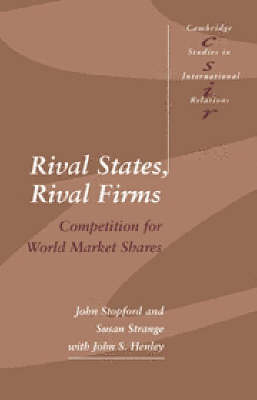Cambridge Studies in International Relations
2 total works
Adopting new and much more comprehensive concepts of both power and politics, The Retreat of the State develops a theoretical framework to show who really governs the world economy. It goes on to explore some of the non-state authorities, from mafias to the Big Six accounting firms and international bureaucrats, whose power over who gets what in the world encroaches on that of national governments. The book is a signpost, pointing to some promising new directions for the future development of research and teaching in international political economy. Its originality and scope make The Retreat of the State of great importance for scholars and students of international relations, business and management.
Rival States, Rival Firms
by John M. Stopford, Susan Strange, and John S. Henley
Published 17 October 1991
In this theoretically original work, two distinguished authors explore the mutual interdependence of states and firms throughout the world. They show how global structural changes - in finance, technology, knowledge and politics - often impel governments to seek the help and cooperation of managers of multinational enterprises. Yet, as Professors Stopford and Strange demonstrate, this is constrained by each country's economic resources, its social structures and its political history. Based on grass-roots research into the experience of over 50 multinationals and more than 100 investment projects in three developing countries- Brazil, Malaysia and Kenya - the authors develop a matrix of agendas. They present the impact on projects of the multiple factors affecting the bargaining relationships between the government and the foreign firm at different times and in a variety of economic sectors. In conclusion they offer some guidelines for actions to both governments and firms and some points to future interdisciplinary research.

